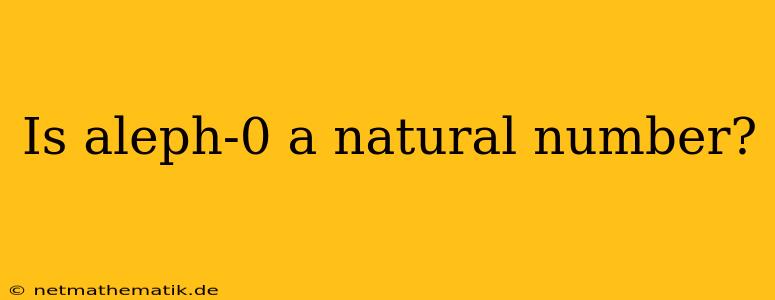The concept of infinity has fascinated mathematicians for centuries, and one of the most intriguing aspects of this concept is the exploration of different types of infinity. Aleph-null, denoted as $\aleph_0$, is the smallest infinite cardinal number, representing the cardinality of the set of natural numbers. While natural numbers are the foundation of arithmetic and are used in everyday life, the question of whether aleph-null itself can be considered a natural number is a complex one that delves into the fundamental nature of infinity.
The Nature of Natural Numbers
Natural numbers, often referred to as counting numbers, are the most basic numbers used to quantify objects and represent quantities. They are typically defined as the positive integers: 1, 2, 3, 4, and so on. These numbers form an infinite sequence that increases without bound, but each individual number within this sequence is finite. This finite nature is a key characteristic of natural numbers.
The Role of Natural Numbers in Arithmetic
Natural numbers are the building blocks of arithmetic and are used extensively in mathematics. They are used for counting, ordering, and performing basic operations like addition, subtraction, multiplication, and division. Their ability to represent finite quantities makes them indispensable for everyday applications, from counting objects to measuring distances.
The Concept of Aleph-Null
Aleph-null ($\aleph_0$) is not a natural number but rather a transfinite cardinal number. It represents the cardinality of the set of natural numbers, indicating that there are infinitely many natural numbers. This means that there is a one-to-one correspondence between the elements of the set of natural numbers and the set of natural numbers itself.
Aleph-Null and the Continuum Hypothesis
The concept of aleph-null is closely related to the continuum hypothesis, a fundamental question in set theory that asks whether there exists a cardinal number between $\aleph_0$ and the cardinality of the real numbers (often denoted as $c$ or $\aleph_1$). This question has been the subject of intense mathematical research and debate, and its resolution remains an open problem.
Why Aleph-Null is Not a Natural Number
The distinction between aleph-null and natural numbers lies in their fundamental nature. Natural numbers are finite, representing countable quantities, while aleph-null represents an infinite quantity that cannot be reached by any finite process of counting.
Properties of Natural Numbers vs. Aleph-Null
Natural numbers possess properties that aleph-null does not. For example, natural numbers are well-ordered, meaning they can be arranged in a sequence such that there is a smallest element and every element has a successor. Aleph-null, while infinite, does not satisfy this property.
The Principle of Induction
The principle of mathematical induction is a powerful tool used to prove statements about natural numbers. This principle relies on the finite nature of natural numbers and cannot be applied to aleph-null, which is infinite.
Aleph-Null in Different Contexts
While aleph-null is not a natural number, it plays a significant role in various areas of mathematics, including set theory, topology, and analysis.
Set Theory
In set theory, aleph-null is used to classify the cardinality of infinite sets. Sets that have the same cardinality as the set of natural numbers are called countably infinite sets.
Topology
In topology, aleph-null is used to study the properties of topological spaces. For example, a space is said to be separable if it has a countable dense subset, meaning a subset whose closure is the entire space.
Analysis
In analysis, aleph-null is used to study the properties of functions and sequences. For example, a sequence is said to converge if its terms approach a limit, and this limit can be a real number or infinity.
Conclusion
Aleph-null, while representing the cardinality of the set of natural numbers, is not itself a natural number. Natural numbers are finite and represent countable quantities, while aleph-null represents an infinite quantity that cannot be reached by any finite process of counting. This distinction underscores the fundamental difference between finite and infinite quantities, and highlights the unique properties of aleph-null as a transfinite cardinal number. Despite not being a natural number, aleph-null plays a crucial role in various areas of mathematics, demonstrating the profound implications of the concept of infinity in our understanding of the mathematical world.
